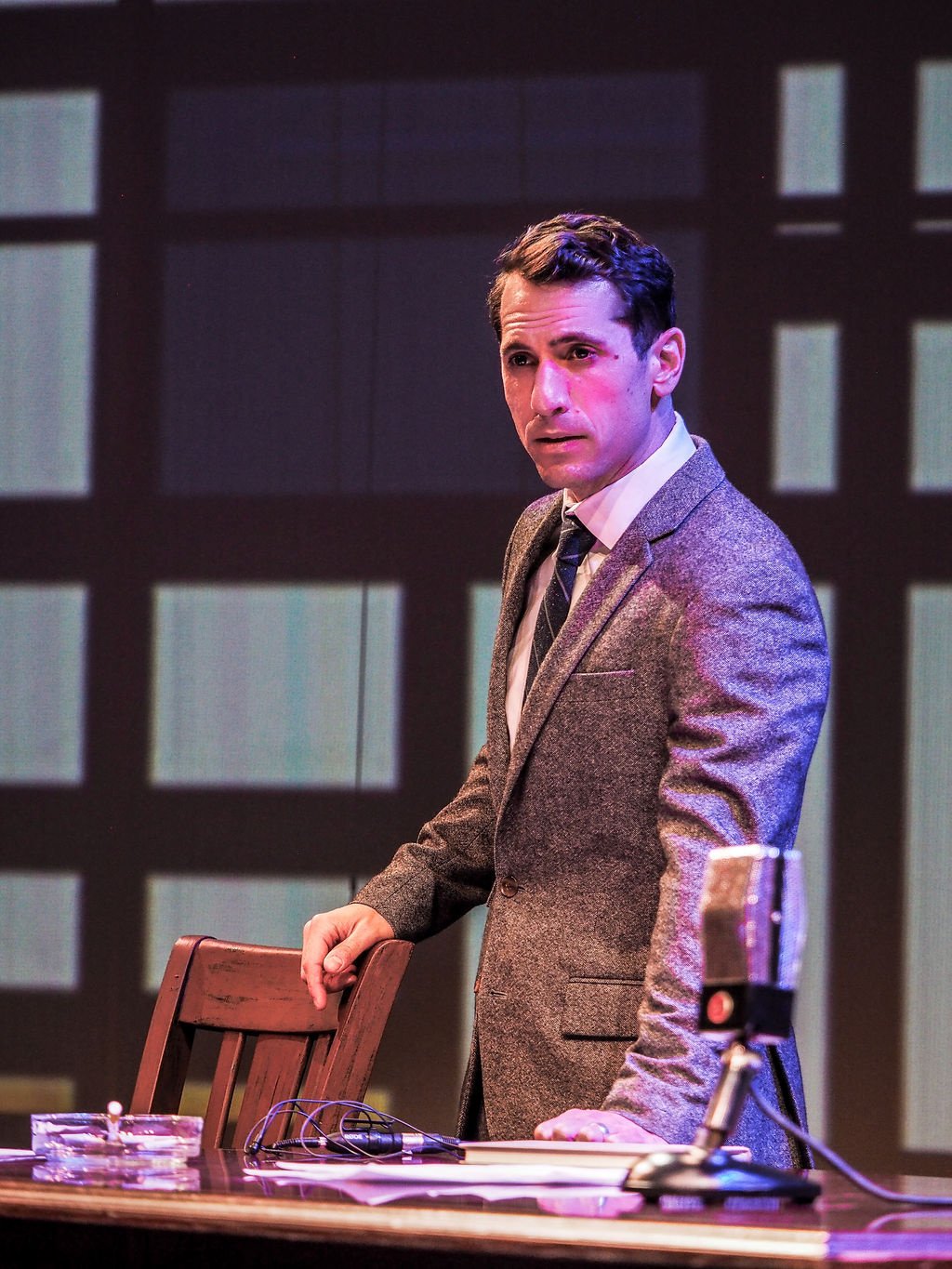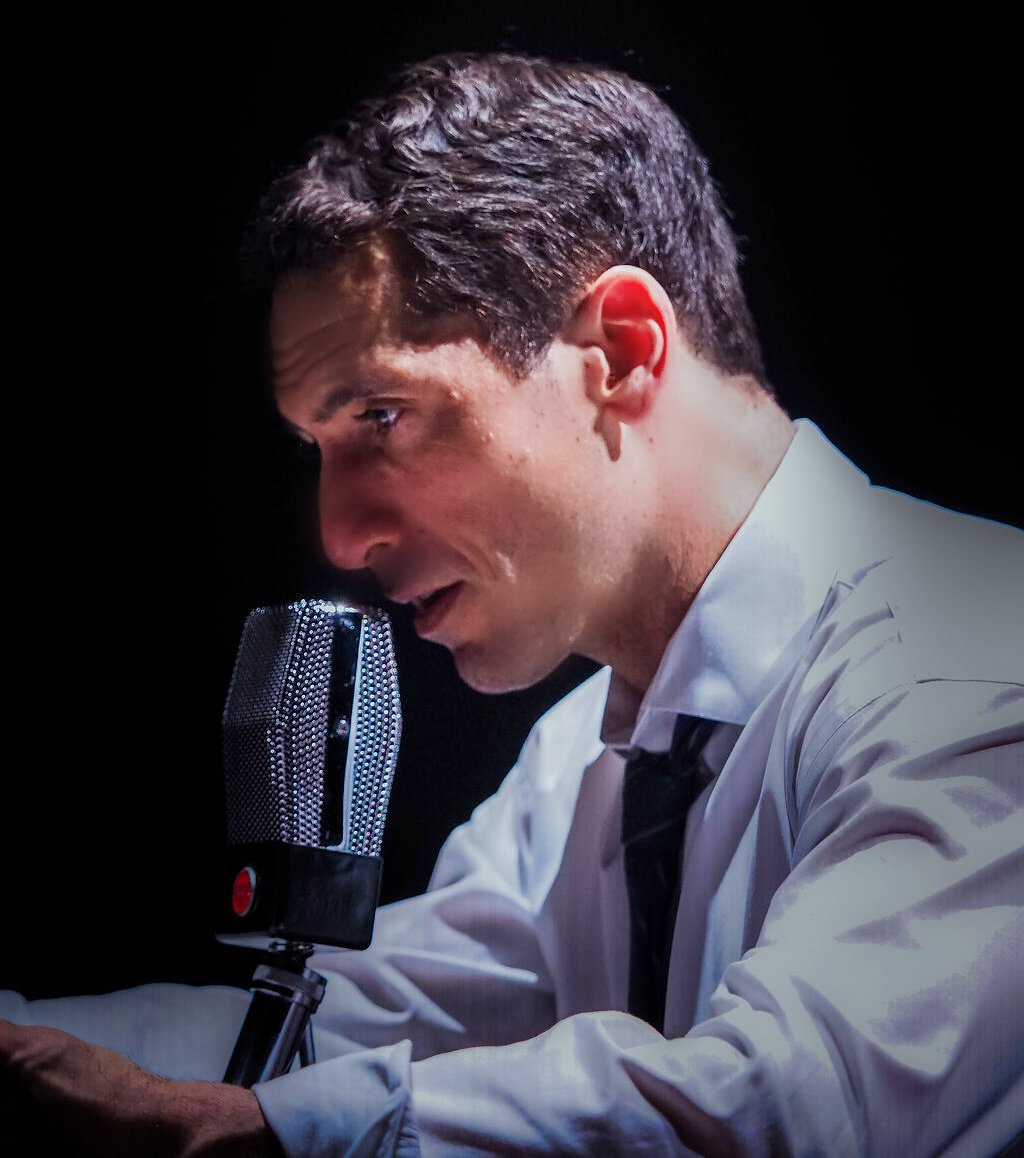‘Murrow’ @ ATTPAC’s The Elevator Project
Show photos by Will McLain; promo on Theater page by Guido Venitucci
—Jan Farrington
The friend who came with me to Murrow spoke the next day with a 101-year-old neighbor who remembers him well: Edward R. Murrow, the deep voice on the radio, sending vivid descriptions of world events thousands of miles from home. A household name in the 1940s and ‘50s.
In the dark early years of World War II, before America was “in it,” Murrow told the nation what he saw, heard, and knew. “This…(he would say) is London”—endlessly Blitzed by the night bombers of Hitler’s Luftwaffe. It’s people slept underground in subway tunnels, fought fires, mourned the dead—and defied their enemy. “E’ll do that once too often!” said a cabbie driving Murrow home, shaking his fist out the window at the sky.
Murrow brought Americans live broadcasts from the city, sometimes standing with a microphone on the roof of a building to let us hear the planes and explosions. He was in Vienna when Jewish shop windows were shattered, and with Patton’s army at Buchenwald to describe some of the horror. He came home to a changed America that worried him.
Joseph Vitale’s one-man play Murrow, part of ATTPAC’s Elevator Project series (this time in the intimate Hamon Hall at the Winspear), is a compelling, well-curated introduction to Ed Murrow’s sprawling presence as one of our most famous and impactful broadcast newsmen, first for the fledgling radio news division of CBS, and later on the network’s television news.
Producer Bren Rapp must know that for much of today’s theater audience, this regional premiere of Murrow will be a first encounter with the man. It’s a timely introduction, reminding us that fighting for democracy, pushing back against tyrants, and asking hard questions about the country we love is the work of every citizen.
And the outcome is never guaranteed. Listening to Ed Murrow is different from reading history. His words are history as it’s made, history that isn’t finished—and we can feel the fear and uncertainty, the determination and hope of the moment. Murrow doesn’t know Hitler will be defeated; he only knows we need to fight.
Actor Nicholas Greco is an engaging figure on the stage. He has Murrow’s contained body language and old-school gravity down pat—in its beginnings, radio/television news wasn’t a casual, conversational business. This was Important, and so were the men (almost all were men) who delivered it. Playwright Vitale draws from Murrow’s letters, broadcasts, and other writings, and from recollections of those who knew him: CBS heads Bill Paley and Fred Friendly, his wife Janet, and more.
Director Montgomery Sutton and some skilled visual add-ons give the show a sense of energy and forward momentum—a good trick with what’s essentially a monologue. Greco moves around the stage with a constantly changing grid of screens behind his desk (projections and graphics of news images, historic figures, Nazi rallies, torches, old newsrooms are by Eric Scot Voecks and Sara Voecks, with scenic design from Clare Floyd DeVries). His quiet, rich tone resembles Murrow’s, and is blended (or perhaps entirely replaced) by Murrow’s own voice as Greco gets close to the microphone for a broadcast (sound design by Kellen Voss). And Aaron Johansen’s cool lighting spotlights the single figure well, dramatically lighting the planes of an interesting face.
Greco’s portrayal gives off a wry humor that reveals a warmer, personal side to Murrow’s sonorous, upright public persona. He must have had a bit of the “Oh, Captain, my Captain” gene: he inspired and led a band of loyal newshounds known as the “Murrow Boys,” youngsters including William Shirer, Eric Sevareid, Charles Collingwood, Howard K. Smith, Winston Burdett, Bill Downs, and Mary Marvin Breckinridge Patterson, the only woman among the original crew.
Murrow takes us through his childhood, his college years (a teacher fine-tuned his most famous wartime phrase) and marriage, his unexpected jump into radio, his experiences during and after WWII, and his too-little-remembered role in bringing down a fabricating politico who “confused the public mind” and threatened our democratic laws and traditions—Senator Joe McCarthy.
“No one can terrorize a whole nation, unless we are all his accomplices,” Murrow said in the 1950s. True then, true now. Maybe you know someone who should hear about this…and him.
WHEN: April 11-21, 2024
WHERE: Hamon Hall (inside Winspear Opera House), Dallas Arts District
WEB: attpac.org


